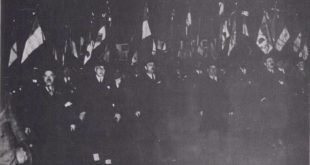AS THE 1930’s drew to a close, only eight countries in Europe, besides Great Britain and France, were still democracies. They were Belgium, Holland, Switzerland, Czechoslovakia, Norway, Sweden, Denmark and Finland. Three of Europe’s most important nations were dictatorships. The Soviet Union was communist; Germany and Italy were fascist. There had been dictatorships before, but these went further; they were totalitarian. The word “totalitarian” comes from the word “total,” and total control is what these dictatorships were after — total control of their people, total control of their actions and thought. There were differences between the totalitarian countries. While Stalin …
Read More »Tag Archives: New Deal
Democratic but Divided 1926-1939
UNLIKE Britain, France was not a highly industrialized country; its economy was fairly evenly divided between industry and farming. For this reason, the depression came to France later than it did to any of the democracies and its effect was less severe, but in no other democracy did communists and fascists play so large a part. For a time there was real danger that the French republic would be overthrown by the fascists and there were riots in the streets. One reason the fascists were so dangerous was that the French people were sharply divided in their political opinions. There …
Read More »Roosevelt Battles the Court 1937-1939
BEGINNING his second term, Roosevelt made it plain that the New Deal would go on. He would continue to work for reforms. He said in his second inaugural address: “In this nation I see tens of millions of its citizens — a substantial part of its whole population — who at this very moment are denied the greater part of what the very lowest standards of today call the necessities of life. “I see millions of families trying to live on incomes so meagre that the pall of family disaster hangs over them. “I see millions whose daily lives in …
Read More »The Election of 1936
As Roosevelt’s first term in office neared its end, many people in the United States — and in other countries — wondered if the New Deal could really solve America’s problems. More than that, they wondered if Americans would continue to follow the path of democracy. A wave of totalitarianism was sweeping the world; would it reach as far as America? There was no doubt that there were some Americans who supported Hitler and the Nazis. Members of the German-American Bund paraded in brown shirts and held a mass meeting in New York’s Madison Square Garden, but there were comparatively …
Read More »A Changing Nation 1934 – 1936
IN THE spring of 1933, as the New Deal roared into action, business began to get better, but it dropped again and as 1933 ended and a new year began, even the most optimistic New Dealer had to admit that the depression was still on. During 1934, the government took further steps to regulate banking and finance‚ but some Americans were dissatisfied. Businessman complained that the government was making it harder to do business. In spite of all the excitement, the NRA was not working out well. The farmers were complaining that prices of farm products were still too low. …
Read More »The New Deal 1933
WHEN Franklin Delano Roosevelt was nominated in 1932, he was fifty years old. A fifth cousin of former President Theodore Roosevelt, he came of a wealthy family. He grew up on a large estate at Hyde Park, New York, overlooking the Hudson River. At the age of twenty-four he married Eleanor Roosevelt, a distant cousin and a niece of Theodore Roosevelt. Several years after graduating from Harvard and studying law at Columbia University, he entered politics and was elected to the state senate. In the presidential campaign of 1912 he supported Woodrow Wilson, who named him assistant secretary of the …
Read More »




